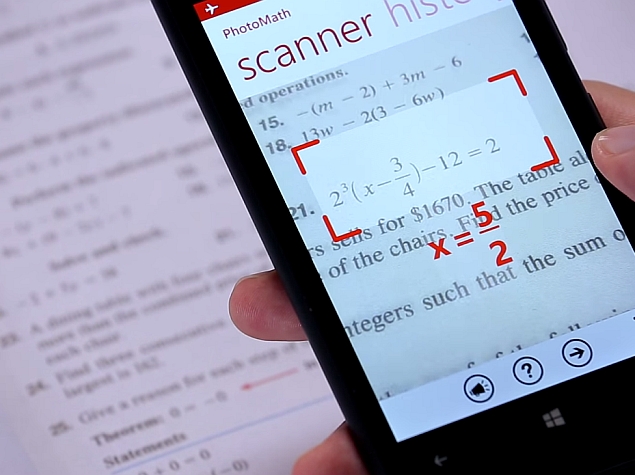
MicroBlink's PhotoMath is making waves on the App Store across
several countries, an iOS (and Windows Phone) app that can solve
equations users scan in via the device's camera, and even provides the
steps taken to solve.
With its augmented reality interface, PhotoMath users have to centre the desired equation to solve on their device's camera, and PhotoMath recognising the mathematical expressions works out the answer, providing a detailed listed of steps taken to solve.
Currently meant to help children, the PhotoMath app is limited to a middle school level of math, as noted by the company's blog post celebrating the app's success, "At this stage it can solve basic arithmetics, fractions, decimals, powers, roots, linear equations and functions like log, exp, sin, cos. It can recognize printed characters only, not handwritten text. The app doesn't solve word problems, geometry, or calculus."
The PhotoMath app is currently available for iOS and Windows Phone users via App Store and Windows Phone Store. Android users would have to wait until 2015 to get their hands on the equation solving app.
The app, soon after its launch, gained popularity and is reportedly the top free iOS app in a few countries currently. "It's really stunning: the PhotoMath video on Vimeo has very quickly reached 2 million views. Our web page has over 9000 page views each minute, and the iOS app alone was downloaded more than 1.6M times in less than three days, becoming the top free app in most countries around the world," stated the MicroBlink blog post on Thursday.
"Most
about PhotoMath focus on it's use as a cheating tool. Let's be honest:
many kids cheat anyway, and an app which solves math problems
automatically won't make this problem worse," it added.
MicroBlink has previously created PhotoPay, an app thet lets users pay bills by scanning it through the smartphone camera lens. As per TechCrunch, which first reported about the app, MicroBlink isn't looking to make money with the PhotoMath app, and is only using it as a proof-of-concept of its optical character recognition technology that it sells to banks and other financial institutions.
With its augmented reality interface, PhotoMath users have to centre the desired equation to solve on their device's camera, and PhotoMath recognising the mathematical expressions works out the answer, providing a detailed listed of steps taken to solve.
Currently meant to help children, the PhotoMath app is limited to a middle school level of math, as noted by the company's blog post celebrating the app's success, "At this stage it can solve basic arithmetics, fractions, decimals, powers, roots, linear equations and functions like log, exp, sin, cos. It can recognize printed characters only, not handwritten text. The app doesn't solve word problems, geometry, or calculus."
The PhotoMath app is currently available for iOS and Windows Phone users via App Store and Windows Phone Store. Android users would have to wait until 2015 to get their hands on the equation solving app.
The app, soon after its launch, gained popularity and is reportedly the top free iOS app in a few countries currently. "It's really stunning: the PhotoMath video on Vimeo has very quickly reached 2 million views. Our web page has over 9000 page views each minute, and the iOS app alone was downloaded more than 1.6M times in less than three days, becoming the top free app in most countries around the world," stated the MicroBlink blog post on Thursday.
MicroBlink has previously created PhotoPay, an app thet lets users pay bills by scanning it through the smartphone camera lens. As per TechCrunch, which first reported about the app, MicroBlink isn't looking to make money with the PhotoMath app, and is only using it as a proof-of-concept of its optical character recognition technology that it sells to banks and other financial institutions.
0 comments:
Post a Comment